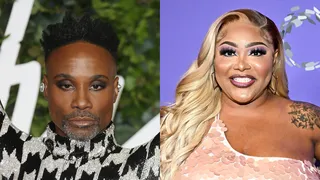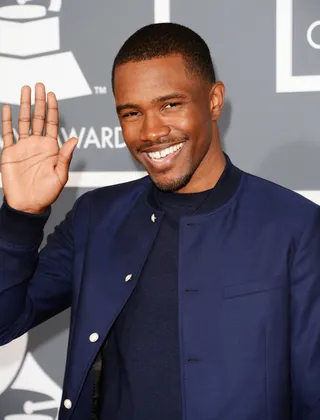Great Moments In Black Queer History
Through the years, these trailblazers changed the world.

1 / 17
From public figures such as Billy Porter and TS Madison, these members of the LGBTQ+ community are self-loving trailblazers. To the recent icons and going back to the Harlem Renaissance, we highlight notable moments in Black queer history.
Photo By Photo by Jason Mendez/WireImage,Photo by Michael Buckner/Variety via Getty Images

2 / 17
NBA center Jason Collins covered the May 2013 issue of Sports Illustrated, being dubbed "The Gay Athlete” by the respected sports publication. Inside the issue, Collins penned an emotionally open letter. “I’m a 34-year-old NBA center. I’m Black. And I’m gay,” the article opened. Since coming out, the courageous athlete received immense amounts of support from his basketball contemporaries and fans alike. (Photo: Sports Illustrated, May 2013)

3 / 17
The ever-so-quotable RuPaul is revered for his iconicity and entrepreneurial spirit, but it was disco legend Sylvester James Jr. who paved the way for the mogul. He was one of the originators of multifaceted androgyny, Sylvester released the single "You Make Me Feel (Mighty Real)" in 1978, which spawned into a smash both in the U.S., and the U.K; This ushered him into the world of pop, which RuPaul is now known for. (Photos from left: Anthony Barboza/Getty Images, Teresa Lee/Getty Images)

4 / 17
Singer-songwriter Meshell Ndegeocello came out as bisexual in the early 1990s, and even had a relationship with feminist author Rebecca Walker. Her debut album Plantation Lullabies provided a noticeably androgynous persona that the world was not used to seeing from women in hip hop. (Photo: Scott Gries/Getty Images)

5 / 17
Though Laverne Cox has made history as the first transgender individual to cover the weekly news publication, it was author and activist James Baldwin who broke the glass ceiling in becoming the first LGBT-identifying individual to grace the cover. His essay “Down at the Cross,” published in his famed book The Fire Next Time, helped him secure cover status in 1963.
ADVERTISEMENT

6 / 17
Proving that coming out is no easy task, Don Lemon came out publicly in 2011. In an interview with The New York Times, Lemon said, “It’s about the worst thing you can be in Black culture. You’re taught you have to be a man; you have to be masculine. In the Black community, they think you can pray the gay away.” Lemon also stated that he would possibly have come out sooner if he had more gay mentors in his life, “I think if I had seen more people like me who are out and proud, it wouldn’t have taken me 45 years to say it.” (Photo: Gary Gershoff/Getty Images for Housing Works)

7 / 17
There would be no Civil Rights Movement if it was not for Bayard Rustin. An openly gay Rustin was Dr. Martin Luther King’s right hand man in organizing the March on Washington. He was imprisoned several times for both refusing to fight in the armed forces, and for "homosexuality." Nonetheless, Dr. King insisted that Rustin be hired to organize the march, which went down in history as one of the most sacred and necessary moments in American history. (Photo: Patrick A. Burns/New York Times Co./Getty Images)

8 / 17
As vocal advocates for LGBT rights and other social movements, Angela Davis and Audre Lorde proved to be pillars of strength and mobility for women, and oppressed groups. Davis, who was vocally opposed to the Vietnam War, fought against racism, sexism, and the prison industrial complex, she also came out in 1997. Lorde expressed her thoughts through writing, releasing her 1978 work The Black Unicorn, which contained a critically acclaimed collection of poems and tackled personal reevaluations and reflections on womanhood, feminism, race, and lesbianism. (Photos from left: Robert Alexander/Archive Photos/Getty Images, Hulton Archive/Getty Images)

9 / 17
In July 2012, R&B artist Frank Ocean explained to the world that his first love was a man. While he never exclusively classified himself into one category within the LGBT community, the Odd Future member said in a 2012 interview, “There’s another side of it that’s just about my own sanity … I’m happy when I wake up in the morning, and not with this freakin’ boulder on my chest." (Photo: Jason Merritt/Getty Images)
Photo By Photo: Jason Merritt/Getty Images

10 / 17
Ignoring the pomp and circumstance of press releases and televised announcements, That’s So Raven star Raven-Symoné came out in August 2013. She tweeted, “I can finally get married! Yay government! So proud of you.” Her tweet was written in response to the Supreme Court striking down the Defense of Marriage Act. (Photo: Michael Kovac/Getty Images for Louis XIII)
ADVERTISEMENT

11 / 17
Novelists, writers, poets and musicians of the Harlem Renaissance made quite an impact on queer culture through their art. Most notably, poet Langston Hughes, novelists Claude McKay and Wallace Thurman, and blues singer Bessie Smith used their words to express their thoughts and personal experiences with LGBT culture. Hughes, McKay, and Thurman's works can all be read as chronicling relationships and friendships within the LGBT community. (Photos from left: CORBIS, Bettmann/CORBIS, Hulton Archive/Getty Images, WikiCommons)

12 / 17
Inspiring modern-day LGBT icons such as Madonna and Beyoncé, Dorian Corey and Pepper Labeija helped introduce ball culture, an underground LGBT subculture in which people “walk” for trophies and prizes at events frequently referred to as “balls.” The doc, Paris Is Burning, is one of the most well-known visuals showcasing ball culture, which featured Corey and Labeija. " (Photos: Academy Entertainment, Off White Productions, Miramax Films)

13 / 17
In 2016, legendary journalist Emil Wilbekin founded Native Son, a platform to celebrate Black queer men. Since then, the Native Son Awards has honored everyone from activists to authors to musicians who are otherwise ignored in mainstream media. Happy Pride!
Photo by @emilwilbekin via Instagram

14 / 17
In 2019, Lil Nas X made history as the first openly LGBT Black artist to win a Country Music Association award for "Old Town Road." He is also the first openly LGBTQ person to win an MTV Video Music Award for Song of the Year for the same song. True trailblazer!
Photo Not Available

15 / 17
In December 2020, Billy Porter became the first openly gay Black man to win the Emmy for Outstanding Lead Actor in a Drama Series for his role on "Pose." Porter will definitely continue to break down more barriers. Porter will also play James Baldwin in an upcoming biopic.
Photo by @outmagazine via Instagram
ADVERTISEMENT

16 / 17
In 2021, TS Madison broke a barrier in reality television and became the first Black trans woman to star in and executive produce her own reality series, which was The TS Madison Experience.
Photo by @tsmadison via Instagram
